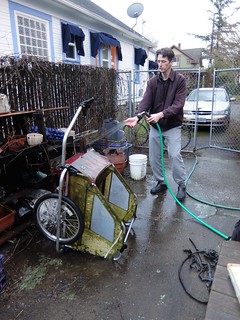A pattern for me, when thinking about concurrency, is to gravitate to cooking in a large well-equipped kitchen with multiple chefs. I should thank Dave DiNucci for connecting these dots for us at a Wanderers presentation.
I folded laundry while watching the "wicked smart" CBS Evening News (alluding to the last story about seeking the authentic Boston accent). Meanwhile, I shouted to my dog downstairs that I'd be back down shortly (she gets lonely, and can't walk, let alone climb stairs). All multi-tasking. Reality runs in parallel even if we imagine "now" time slices in sequence, integrating the differences.
The Gathering of Western Young Friends was also influential, in developing my appreciation for an institutional kitchen. This group of Quaker-Pagans sought out remote retreat center camping facilities that would allow the customers to take over logistics in a big way.
We brought in our own supplies and orchestrated the meals. It helped that a few of us (not me so much) were serious foodies, the kind with their own knife rolls. Some had cooked professionally.
Fast forward to Food Not Bombs. When one joins a food prep team as an anonymous stranger, with others on the team also unknown to one another, with the ingredients for that day also somewhat luck of the draw, then collaboration powers inevitably get developed (unless there's a breakdown). People have an ability to self-organize, given optimum conditions (e.g. the prospect of a healthy meal as a reward for task completion).
I was able to book our Quaker meetinghouse on Stark Street for a year of such experiments. We pulled it off every Thursday. My house was a hub for bicycle trailers coming and going. We had some room for inventory, both at my house and in the meetinghouse basement (just a single box in the latter location). My blogs chronicle this chapter and suggests one's habits have a way of perpetuating themselves, have a kind of inertia of their own. Isn't that why we call them habits?
The most powerful habits are habits of mind, which may encounter the least resistance. Physical habits maybe change, but in thought we have freedom, including the freedom to get stuck in a rut. Learning to get free of thoughts that comprise a mental prison more than a path to liberation is a life-long challenge.
We need fast reflexes to get by. Habits of thought are not in and of themselves "bad" so much as "potentially worth countering" -- usually with other habits. We learn to consciously cultivate new habits as a way of dampening obsolete ones.
In team sports, coaches strive to impart the habits associated with team work. In my essay on Home Economics for MathFuture, I stress the similarities between athleticism and multi-tasking with others in a well-equipped kitchen. Sailing a boat likewise requires working as a crew.
Every successful enterprise needs team players with an ability to work together, developed over time through practice. Home Economics, as much as any team sport, might become a basis for infusing these skills more widely through what we call school.
I folded laundry while watching the "wicked smart" CBS Evening News (alluding to the last story about seeking the authentic Boston accent). Meanwhile, I shouted to my dog downstairs that I'd be back down shortly (she gets lonely, and can't walk, let alone climb stairs). All multi-tasking. Reality runs in parallel even if we imagine "now" time slices in sequence, integrating the differences.
The Gathering of Western Young Friends was also influential, in developing my appreciation for an institutional kitchen. This group of Quaker-Pagans sought out remote retreat center camping facilities that would allow the customers to take over logistics in a big way.
We brought in our own supplies and orchestrated the meals. It helped that a few of us (not me so much) were serious foodies, the kind with their own knife rolls. Some had cooked professionally.
Fast forward to Food Not Bombs. When one joins a food prep team as an anonymous stranger, with others on the team also unknown to one another, with the ingredients for that day also somewhat luck of the draw, then collaboration powers inevitably get developed (unless there's a breakdown). People have an ability to self-organize, given optimum conditions (e.g. the prospect of a healthy meal as a reward for task completion).
I was able to book our Quaker meetinghouse on Stark Street for a year of such experiments. We pulled it off every Thursday. My house was a hub for bicycle trailers coming and going. We had some room for inventory, both at my house and in the meetinghouse basement (just a single box in the latter location). My blogs chronicle this chapter and suggests one's habits have a way of perpetuating themselves, have a kind of inertia of their own. Isn't that why we call them habits?
The most powerful habits are habits of mind, which may encounter the least resistance. Physical habits maybe change, but in thought we have freedom, including the freedom to get stuck in a rut. Learning to get free of thoughts that comprise a mental prison more than a path to liberation is a life-long challenge.
We need fast reflexes to get by. Habits of thought are not in and of themselves "bad" so much as "potentially worth countering" -- usually with other habits. We learn to consciously cultivate new habits as a way of dampening obsolete ones.
In team sports, coaches strive to impart the habits associated with team work. In my essay on Home Economics for MathFuture, I stress the similarities between athleticism and multi-tasking with others in a well-equipped kitchen. Sailing a boat likewise requires working as a crew.
Every successful enterprise needs team players with an ability to work together, developed over time through practice. Home Economics, as much as any team sport, might become a basis for infusing these skills more widely through what we call school.

